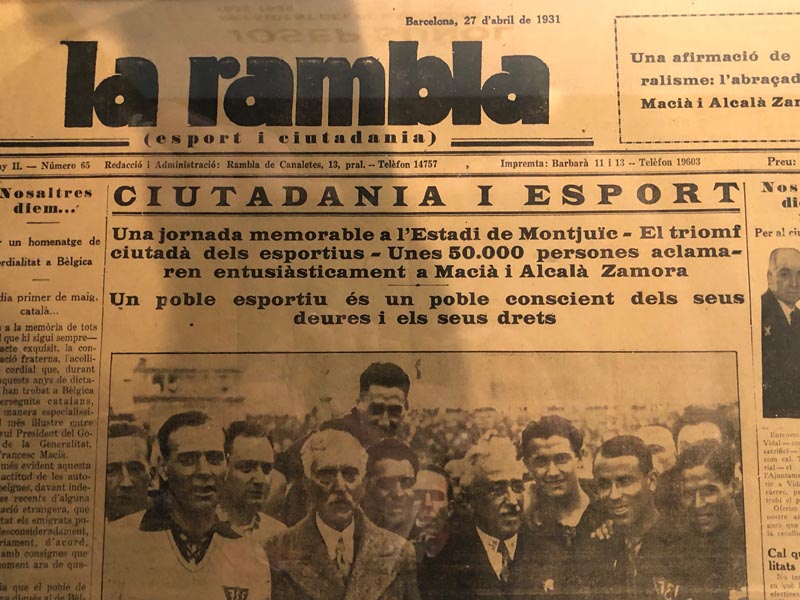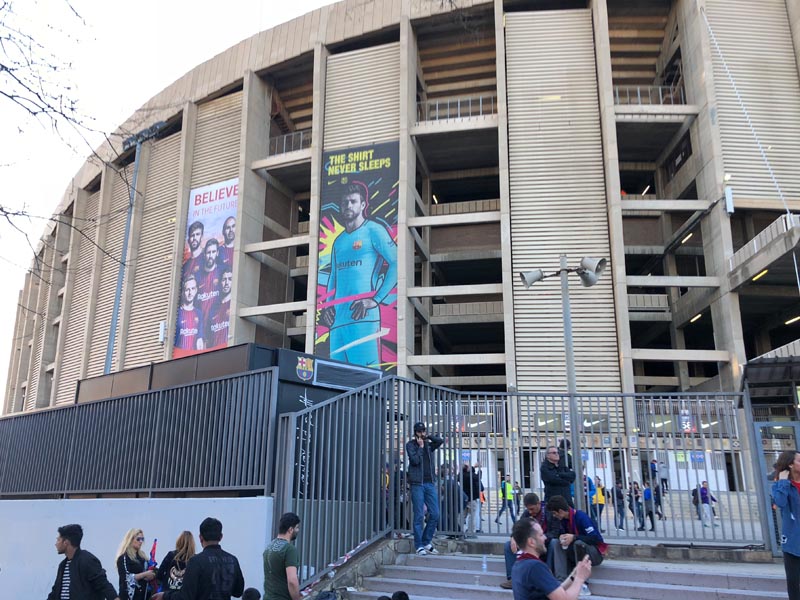Barça - Barcelona Football Club
Alexis Plaza discusses Barça, and his family’s relationship to the Barcelona Football Club.
Pere Marcet is my great-grandfather, and one of the founding members of the Barcelona Football Club. Also one of the first players. He managed a family-owned milk distribution company As luck would have it, a Swiss company was starting to install floor heating in Spain and Barcelona. They hired him as a manager. From there, he met the Witty brothers, Hans Gumper and the founders of FC Barcelona. Barça is, as we say, more than a club, because, just like in other countries, the team was created to entertain the lower classes. At times when people were very oppressed, long ago, before the Civil War. Barça existed before, during and after the Civil War. And Barça was very important. Today Barça is identified closely with Catalanism. It’s a symbol for us and how we’ve done things, more so than with other Spanish clubs, like Real Madrid. When I’m lucky enough to travel, I see these people. Barça is such a big club these days, and so is Madrid. But the people who’ve grown more familiar with the club, that have visited the stadium, grown familiar with the club’s Catalan identity, discover a love, a passion for the club. They identify with it. As we said, more than just a club. We are unique. It’s something bigger than football. In Franco’s time, the repression was very bad. Some presidents of the Barcelona Football Club, like Josep Sunyol, were murdered. After that, the team was always supposed to lose when it played Madrid. Madrid had to win everything, and Barça always lost. The scores were shocking. Like 11 – 1. Crazy things took place. The stadium and the name of the club were also changed. The club, which was called Futbol Club Barcelona, was renamed Club de Futbol Barcelona, because you couldn’t say the name in Catalan. Catalan was banned at the time. The repression was harsh. I don’t know the history. It happened so long ago. But the players were threatened. Beating Madrid could lead to bad things happening. After the Civil War, the country was ruled by Francisco Franco. During that period, one of the greatest players, Alfredo Di Stéfano, played for Madrid, even though he’d first come to Spain and signed with Barça. Barça signed Ladislao Kubala, a legend for us, and Alfredo Di Stéfano, but Di Stéfano only trained for two days with Barça. And after that, a new rule was manufactured by the government which voided his signing with Barça and sent him to Madrid. They were afraid that Barça would start winning. It’s the Classic. We mustn’t forget that Madrid was founded by two Catalan brothers. It’s a rivalry that goes back many years. Especially since it’s a capital city against what was a provincial city. But it all got mixed up in the evil of Francoism, and, even now with the politics of today, the rivalry gets bigger every day. Because one team represents Catalanism. They bear the flag of Catalonia and Barcelona. And the other represents Spain, Nationalism and centralism. Many outside Spain dentify with us because they see it as more than an athletic battle against Madrid and the government. which, in the end, is the same thing. I truly believe… their popularity is the result of one player: Lionel Messi Barça has had the best player in the world on its team. We could discuss Ronaldo, Romario, Rivaldo, Rodaldinyo. but it started with Leo Messi’s arrival. He’s like Babe Ruth in the United States. A player that shattered all records, that is on everyone’s lips, that everyone wants. He’s brought Barça to the world stage. And we shouldn’t forget that, for many years, they jointly wore the UNICEF logo free of charge. Putting money aside. This also demonstrated that Barça is a world-class club, and the positive nfluence of sport. The relationship isn’t good. And here I’m blaming politics, both government politics and the politics within the sport. Because Espanyol, I remember…we used to live next to the Espanyol’s old field in Sarrià. Their board of directors didn’t control spending, and they had to sell their field. It was purchased by city hall, who then didn’t hesitate in demolishing the stadium. First, they were renting the field on Montjuïc. Then they got kicked out. The Periscos, the partners at Espanyola, have long hated both Barça and the city for that reason. It’s not our fault that this happened. We were a very young group of people. Very young and very capable, and we were tired. We had been club members all of our lives. At the time, I had been a member of the club for more years than the winner of Barça’s election. The club’s front office was going in a direction we didn’t like, and we were sick of it. We didn’t think it would end well. We were tired of it, and so we said, “Look. We’re members. We can do it.” “Look at the by-laws. It’s legal. Let’s go for it.” We campaigned for many months, and, initially, our fear was that we’d succeed. We could talk about Donald Trump. It’s the media that actually rules. The press decides who is worthy and who isn’t. Even though they can be wrong. And I’ve got to say, we were ready and able, and we were the youngest candidates in the whole history of the club. It was a beautiful experience. We were so close to Barça. Many ex-players and important people were with us. They knew our hearts were in the right place, committed to the club. But, as soon as we began the process, we realized how political it all was, and didn’t like it. It was a beautiful, but frustrating experience. We knew that someone else would win and nothing would change.
Jordi Rosello discusses the region’s focus on Barça.With political and social, or Catalan, repression Barça served, for some years, as an escape valve. A symbol that crossed many classes of Catalan people. The slogan: Barça is more than a club. It was a way to identify with and express identity through a project, a community. That’s all there was. There weren’t political parties or associations. So Barça filled a role, and there’s still that identification with the country, with Catalunya. Do you support Barça? No. Are you a sports fan? I sympathize with Barça, but there’s a difference between a sports club and a country. I’m happy when Barça wins, but when they don’t, it’s not the end of the world. We sometimes sublimate our problems. We find it difficult to accept reality. So, if Barça wins, it seems that we all win, but it is not true. A sports team is winning. But if I don’t make it to the end of the month, or my children can’t go to school, or there are problems, it solves nothing for me. Somehow we deceive ourselves, or it serves us to deceive ourselves.
David Aznar explains why Barça is truly Catalonia’s team.Of course. A great team, and, if you ask me, deeply entrenched in Catalan identity. My grandfather was a basketball referee. He had to referee a match a long time ago, in the ’50s, during the Franco dictatorship. Real Madrid victory was always part of the equation. An agent from the National Movement told my grandfather that he had to fix the game. He refused, and because of that, his entire career was spent refereeing regional games throughout Catalonia. Never international ones. There was a match at the state level, but little else, all because he didn’t fix the game for Madrid. What is undeniable is that Real Madrid represented the Franco regime. That may weigh heavily on some Madrid players, but there are those who love it. It’s a fact. Anyone will tell you. Anyone willing to be objective. And Barça, for a long time, was prevented from rising to an international level. Di Stéfano had to come to play for Barça, but was taken by Real Madrid on orders from the regime. Because then Di Stéfano and Kubala would have played on the same team. That surely would have resulted in Barça winning all of those European cups, and not Madrid. Barça was also, at the same time, during Franco’s time, was one of the few places where Catalan was heard, where Catalan flags were first seen again. Barça is not only important to Catalonia. It’s an identity that’s embraced around the world. Messi is practically an ambassador. Why? Because we are so passionate. It’s a unique relationship, unlike other sports or teams. I don’t know. Maybe Celtic Glasgow has something similar. Of course, there are some who follow Espanyol or Madrid within Catalonia. Or Reus, or Girona or any other team. Most Barça fans are in favor of Catalan independence. As you may know, Barça has announced its support for a referendum on independence. This commitment to the referendum has proven an inconvenience to numerous political and social sectors, but others love it. Yes, for me. Barça is closely identified with Catalan culture. It’s the city’s team. And, on top of that, Espanyol has moved to Prat de Llobregat, and was never that significant. Not to go into too much detail, but they have their own base. But Barça has always been a supporter of Catalanism. Even going all the way back to the Primo de Rivera dictatorship, they’ve supported Catalan culture. Barça’s impact on Catalan people has always been, and continues to be strong.

1931 – Newspaper of Barça posing with President of Catalunya Francesc Macià

2018 – Outside Barça’s Camp Nou before a game
